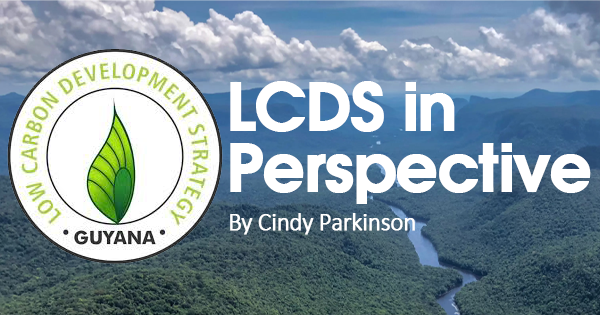– spotlights LCDS 2030 priority action to tackle plastic pollution
IN honour of World Environment Day, which was observed on June 5, the Environmental Protection Agency (EPA) sponsored its annual Green Walk and Exhibition in Guyana on June 4. The theme of the festival this year is also one of the main programme areas of Guyana’s Low Carbon Development Strategy 2030 being, “Solutions to plastic pollution.” An EPA delegation led the walk, which started at 6:00 a.m. near Camp Street and North Road in Georgetown and ended on the National Park’s tarmac. There were many delegates from the government and well-known corporations who all understood the importance of working together and their responsibility to ensure a sustainable, pollution-free future.
A major priority of LCDS 2030 centres on creating a circular economy. In a circular economy, resources are kept in use for as long as possible, the maximum value is extracted from them and then, at the end of their life cycle, they are recovered to regenerate new products and materials.
Some progress has been made towards better waste management in Guyana in recent years. In 2021, US$5 million was invested to improve solid waste management across the country, while US$7 million is being invested in 2022 for the upgrade of existing disposal facilities. However, more work is planned for Guyana to achieve a circular economy by 2030, and LCDS 2030 charts the path to achieving this. This will require significant government and private sector investment over many years, but also behavioural change by citizens and businesses so that waste is prevented, as well as better managed. Some of the priority actions identified in LCDS 2030 to achieve this include:
• A national recycling system.
• New measures to minimise, and where possible eliminate, single-use plastic, batteries, and other specific sources of pollution.
• Incentives for improved design of products and services to prevent waste
• Enabling the public sector to act as a leader in pursuing and demonstrating circular economy practices.
• Promotion of education measures on avoiding littering and maximising recycling.

At the Green Walk event, awards were granted not just for the best chant but also for the best banner, the largest contingent, consistency, and uniformity. The opportunity for like-minded people to network, support sustainable businesses at the exhibition, and have important conversations made the event, in the opinion of the EPA, more than just a walk and exhibition. Over the past few weeks, the EPA has planned or taken part in a range of activities to increase public awareness of the environment and how we can all work to better care for it. A panel discussion hosted by the EMC Foundation last Friday was one of these events. The EPA also held an exhibition of artwork commemorating International Day for Biodiversity at the National Gallery of Art.
The largest international celebration of the environment, known as World Environment Day, is held every year on June 6. Following its establishment by the UN General Assembly in 1972, this year celebrates the 50th anniversary of World Environment Day. Comparably, the Caribbean Community was founded in 1972 and is currently commemorating 50 years of fusion, collaboration, and growth.
“Solutions to plastic pollution” is the focus of 2023. One of the most urgent environmental issues of our time is plastic pollution, which has enormous effects on our oceans, biodiversity, health, and climate. A garbage truck’s worth of plastic is dumped into the ocean every minute, according to the UN Environment Programme (UNEP), which estimates that more than eight million tonnes of plastic enter the ocean annually. At every stage of its existence, from production to disposal, plastic emits greenhouse gases. At the regional level, this is also a priority action. CARICOM is dedicated to combating plastic pollution and advancing sustainable patterns of consumption and production.
Here are a few of the initiatives CARICOM is implementing in keeping with the 2023 World Environment Day theme:
In order to lessen the production of plastic waste and its effects on the marine environment and human health, CARICOM has created a regional strategy for the management of marine litter and microplastics. The St. John’s Declaration, which was developed in 2019 by heads of state and government, outlined the approach and included actions including a ban on single-use plastics, the promotion of circular economy models, the improvement of trash collection and recycling infrastructure, and public awareness and education campaigns.
CARICOM is aiding its member states in establishing and upholding national laws and regulations in order to reduce plastic pollution and enhance sustainable development. Examples of nations that have already banned or imposed restrictions on single-use plastics and styrofoam products include Antigua and Barbuda, the Bahamas, Barbados, Belize, Dominica, Grenada, Guyana, Haiti, Jamaica, Saint Lucia, Saint Vincent and the Grenadines, Suriname, and Trinidad and Tobago. The trade ministers of the CARICOM Council for Trade and Economic Development (COTED) have considered these restrictions and other trade-related policy measures. The Secretariat then commissioned continuing studies to look into the technical and financial recommendations of plastic alternatives and potential limitations in order to help the member states with their transition.

The “Clean Seas Caribbean” regional programme, which urges companies, organisations, and individuals to take action to reduce plastic waste and protect marine biodiversity, was introduced in 2021 with support from the CARICOM member states. The campaign supports initiatives including beach clean-ups, festivals without plastic, environmentally responsible shopping habits, and innovation competitions.
To promote capacity building for implementing international environmental agreements, the CARICOM Secretariat is conducting regional assessments to better understand the plastic waste and solid waste management concerns in the region. The European Commission sponsors the project. Additionally, it is producing manuals for practitioners that include best practices and regulations. Also, being examined are many aspects of garbage and recycling, particularly those that involve mercury. For the proper handling and disposal of these commodities, see the Minamata Treaty.
Senior environmental authorities will meet on June 19 to talk about pressing environmental issues, including how to organise CARICOM involvement in talks for a legally binding global agreement to stop plastic pollution. Later this month, there will be the 108th Special Meeting of the Council of Trade and Economic Development on Environment and Sustainable Development (COTED), which will be followed by a meeting of environment ministers. CARICOM is taking these and other measures to demonstrate its leadership and commitment to effectively combating plastic pollution and preserving the environment for both present and future generations. If we all cooperate on World Environment Day in 2023, the Caribbean can become a cleaner and greener place.
At the national level, Guyana LCDS 2030 will advance programmes that enhance climate awareness and behavioural change in addressing all forms of pollution, while promoting responsible consumption patterns, and overall encouragement for safe and healthy well-being amongst all Guyanese.
(This is part of a weekly series on LCDS.) The author can be contacted at [email protected]).



